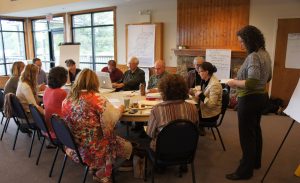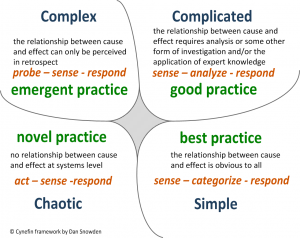By Tracy Kunkler, MS – Social Work, professional facilitator, planning consultant, and principal at http://www.circleforward.us/

Image 1 – Photo of AFP team meeting.
In the blog on May 4th, Propositions for Organizing with Complexity; Learnings from the Appalachian Foodshed Project (AFP), Nikki D’Adamo-Damery described nine propositions that emerged from the work of the AFP. Proposition #2 was: “Establish Consent instead of Consensus.” The following story describes one of the experiences that led to this proposition.
This arose when the AFP management team met to award mini-grants to on-the-ground projects that addressed community food security. The team included the principal investigators, graduate students, extension agents, and representatives from community-based organizations, and so reflected some of the diversity of the system within which they were working. The team was using a collaborative decision-making framework, and the basis for decisions was the principle of consent. Read more



